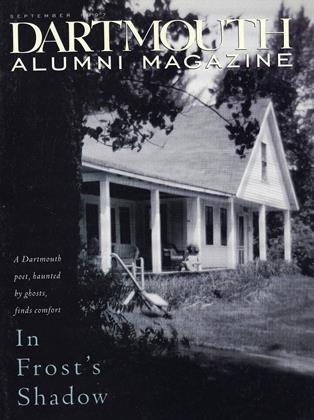(Scene: Deborah Nichols, who receivedher Ph. D. in anthropology from Pennsylvania State University in 1980 and whohas been teaching at Dartmouth since1985, sometime as chair for the department of anthropology. With her is herhusband, John Watavabe, who receivedhis Ph. D. in social anthropologyfromHarcard in 1984. and who has taughtanthropology and Latin American studies at Dartmouth since 1989. Our twoanthropologists are in Professor Nichols's office on thefirst floor ofCarpenter Hall. The wall outside her office is covered with cartoons... mostly "The Far Side " and "Calvin and Hobbes." Mostly anthropologyjokes. She is sitting in her chair. Watanabe stands and looks at the pictures in her office.)
DEBORAH; It was a big year. JOHN: The 1989-1990 academic year DEBORAH: I'd say it was a Very full year or so in our lives.
JOHN: It was my first year at Dartmouth tlie of time upstairs in my office, acclimating, happened there was another faculty member hanging around the anthropology Deborah.)
DEBORAH: (Laughs) I was not "hanging around." I was" very busy.
JOHN: Okay, whatever...she was around. She was scurrying around about to get tenure.
DEBORAH: I was writing a grant and doing the paperwork for my next trip to Mexico.
JOHN: We statrtel spending time together.
DEBORAH: It also happened to be the year I got tenure.
JOHN: And the year we decided to get married.
DK.BORAH: One thing led to another quite qujcklv.
JOHN: We bought a house in Norwich and got married there.
DEBORAH: Had a baby, our son Aaron, in 1991. (She points to the mostrecent photograph of Aaron.)
JOHN: We were just a little busy.
DEBORAH: Aron is great. He's always been gregarious, articulate.
JOHN: He's a non-stop talker.
DEBORAH: (Smiling) Very articulate.
JOHN: I guess he has to be to get a word in around our household.
DEBORAH: (Looking at more photographs) He looks quite a bit like John.
JOHN: On my last research trip to Guatemala I took with me this wonderful photograph of Aaron in a snow bank. Of course the Mayans have never seen snow. And here's a shot of my son up to his armpits in a hole he's dug in the snow. They were truly amazed by it, but I'm not sure they really got the idea.
They've seen frost, but it's difficult to extrapolate from frost to blizzard.
Someday I'll bring Aaron. Maybe he can explain the experience of snow.(He smlies.) I can even imagine him making lasting friendships with these people a world away. They're about to get their first telephone.
Maybe someday they'll be phoning each other back and forth. It's a strange thought.
DEBORAH: I wish I could bring him to my site outside of Mexico City as well. In many ways it would be a fabulous experience for a child his age.
JOHN: They have the best cook in the world for one thing. Incredible chiles.
DEBORAH: I think he'd learn Spanish so easily in that environment. I'd like him to experience a different culture. But there are other serious issues. The air pollution alone has prevented me from bringing him so far. Before I came to Dartmouth I was director of a project in northern Arizona on land that belongs to the Navaho and Hopi tribes. We lived in tents in a camp. He'd have loved it. That would have been different.
JOHN: Tell them your nickname.
DEBORAH: (Sherollshereyes.) Sometribes there use nicknames as part of their humor. Lots of the nicknames are crude—l really can't generalize, but sometimes nicknames are descriptive and not always of a person's most flattering characteristics. Crude may not be quite right, because the humor can be pointed and sophisticated. I know they called me plenty of things, most having to do with my hair. When you live in a tent long curly hair gets rather wild—not a big fashion among white women in the early 1980s . I don't speak Navajo, but I know they called me "Big Hair''—and much worse.
JOHN: The Mayans use nicknames too. I don't know what they call me. I don't think I want to know. Actually, I'm sure I don't want to know.
 View Full Issue
View Full Issue
More From This Issue
-
 Cover Story
Cover StoryIn Frost's Shadow
September 1997 By CLEOPATRA MATHIS -
 Feature
FeatureThe Tightrope
September 1997 By Dan Fagin '85 -
 Feature
FeatureUninight
September 1997 By DOUGALD MACDONALD '82 -
 Feature
FeatureThe Cult of Domesticity
September 1997 By Christine Altieri -
 Article
ArticleRoad Trip
September 1997 By Sarah Moore -
 Article
ArticleElevator Going Up, AstroTurf Going Down
September 1997 By "E. Wheelock."
HEATHER MCCUTCHEN '87
-
 Cover Story
Cover StoryRev. Gwendolyn King
OCTOBER 1997 By Heather McCutchen '87 -
 Cover Story
Cover StoryWilliam Cook
OCTOBER 1997 By Heather McCutchen '87 -
 Cover Story
Cover StoryMargaret Otto
OCTOBER 1997 By Heather McCutchen '87 -
 Article
ArticleVoces
DECEMBER 1997 By Heather McCutchen '87 -
 Article
ArticleJohn Collier, Aet I: Getting All the Snow Off
APRIL 1998 By Heather McCutchen '87 -
 Feature
FeatureFirst person
MARCH 1999 By Heather McCutchen '87







